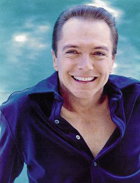
David Cassidy in the News
THEATER : IDOL TEARS : For years, no one would take David Cassidy seriously. But finally, that's changing.
February 02, 1995
Jim Washburn
Los Angeles Times
"Some people call me a teen - age idol, but that's not really me,
I guess they've got no way of knowing how lonesome I can be."
Those words were sung in the 1950s by Ricky Nelson, the first television-spawned teen idol, and they have applied ever since. For all the easy fortune of cathode tube Adonises, their stardom always seems to be bittersweet and short-lived, with a stigma that lingers.
"It seemed whenever I'd read my name, it would be David 'former teen idol sex symbol' Cassidy," says former teen idol sex symbol David Cassidy. "I used to think, 'Well, I guess I'm going to have to do something more significant in my life, like David 'convicted felon' Cassidy or something,' anything that would erase that convenient label."
Fortunately, the onetime Partridge Family heartthrob hasn't had to resort to a life of crime. Rather, he has been rescued by the Willy Russell musical "Blood Brothers," in which Cassidy appeared for 10 months on Broadway. He reprises his role at the Orange County Performing Arts Center beginning Tuesday.
In "Blood Brothers," which Cassidy describes as more a play with music than a traditional musical, Petula Clark plays a working-class mother of twins. Unable to care for the children she already has, she gives one twin (played on Broadway by Cassidy's half-brother Shaun; played here by Tif Luckenbill) away to a wealthy woman, while the other, Mickey--played by Cassidy--grows up in poverty. Unaware of their relationship, the fraternal twins later meet and become friends until they fall in love with the same girl.
If "Blood Brothers" has rescued Cassidy from his teen-idol label, it's only fair, since it was his and Clark's addition to the Broadway cast that saved the production from a perilously low box office. When they joined in August, 1993, the show had been losing $32,000 a week. With their names on the marquee, it quickly began turning a profit, getting raves from audiences and even faring well with critics.
The acclaim Cassidy has received in his role has led, he said, to other Broadway offers and a promising TV pilot. And finally, at age 43, he says he is back on the path of serious acting that he was sidetracked from a quarter-century ago.
Cassidy spoke by phone from a hotel in Denver, where he was registered under an assumed name because, he said, some things never change. There are still fans who try to track him down. He considers the precautions he has to take to maintain a private life part of the deal that comes with success.
"I don't see it as a bad thing, just part of my life. I suppose there was a time for me when the assumed name wasn't necessary. I guess it's good news that it is again, isn't it?" he said with a laugh.
Cassidy's mercurial success story is related in his autobiography published last year, "C'mon Get Happy . . . Fear and Loathing on the Partridge Family Bus." A Cliffs Notes brief on the book might read:
All David Cassidy--son of actors Jack Cassidy and Evelyn Ward, stepson of Shirley Jones--wanted was to be a serious actor and play guitar like Jimi Hendrix. Instead, he signed on with a huge promotional machine that put his face on TV, magazine covers and lunch boxes and had him record simplistic pop tunes. Sure, he partook of the fruits of that: the millions in concert earnings, the pampering by toadies, the blind adulation of 50,000 screaming fans a night, the moist assignations with oodles of willing young fans and groupies. But do you think for one minute that made him happy? Nope. Afterward, no one took him seriously, and it required years of analysis to bring him to where he is today. The end.
Compared to the millions of kids going to bed hungry every night, one might not be inclined to give much weight to the suffering of the rich and famous. That is to ignore, though, the uniquely uncomfortable pedestal the public puts them on, and the practically mythic lessons to be derived from their travails. That the poor suffer is a given. That someone on entertainment Olympus was miserable might suggest that dreams are better directed elsewhere.
Cassidy comes across as a likable guy, but there's no mistaking him for the guy next door. When he talks, he seems to be running on TV talk-show time, speaking in compressed, run-on sentences, as if he's trying to get everything in before the commercial break.
In "Blood Brothers," he said, he's found a role that not only reasserts his acting ability but also "is the reason I got into all this. It's a wonderful part. Examining it and living it in playing this guy's life, it's never ceased to be interesting and exciting and the reason why 25 years ago I decided as a teen-ager to become an actor. It was to be able to do exactly what I get to do with this.
